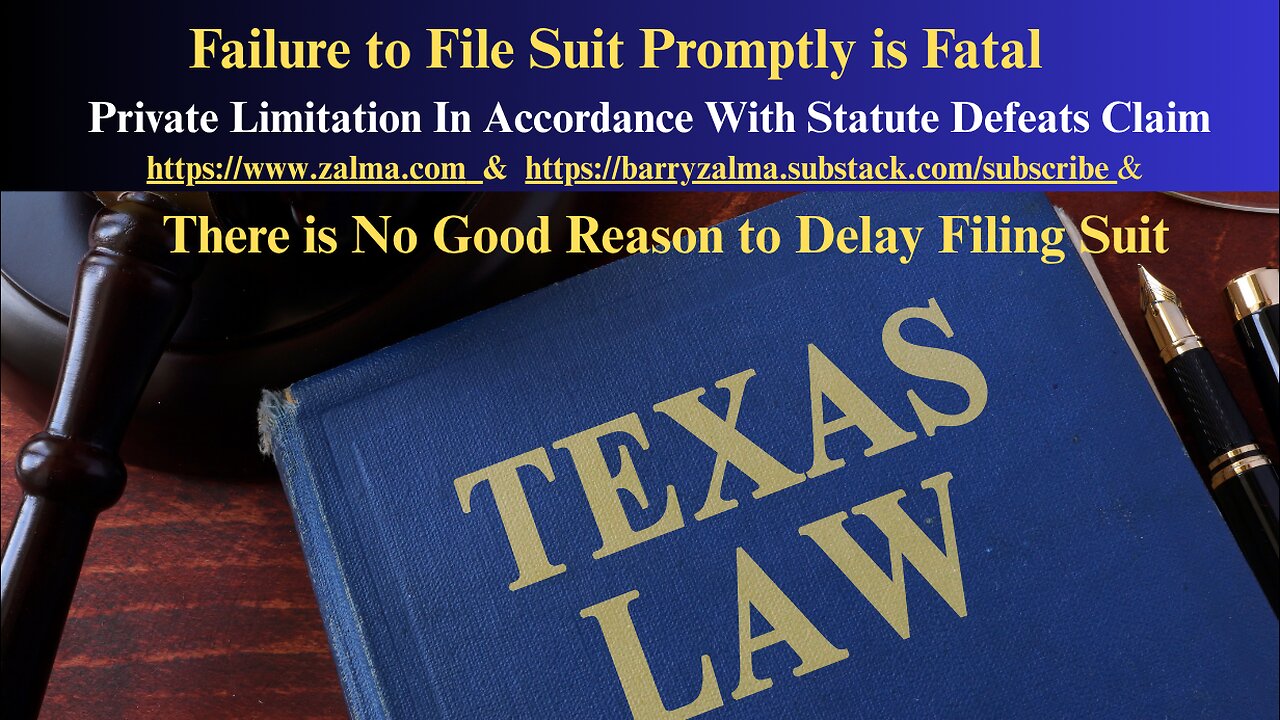Premium Only Content

Failure to File Suit Promptly is Fatal
Private Limitation In Accordance With Statute Defeats a Claim
Post 5204
There is No Good Reason to Delay Filing Suit
In Christian Care Center v. American Alternative Insurance Corporation, Civil Action No. 4:25-CV-00321-O, United States District Court, N.D. Texas, Fort Worth Division (October 6, 2025) a private limitation of action provision effective barred the suit.
KEY FACTS:
Plaintiff and Defendant:
The case involves an insured, the Christian Care Center (Plaintiff) and its insurer American Alternative Insurance (Defendant) in a coverage dispute.
Loss Event:
Plaintiff's property sustained damage due to a storm on April 27, 2020.
Insurance Claim:
Plaintiff submitted a claim to Defendant on February 2, 2022, which was denied on July 29, 2022.
Lawsuit:
Plaintiff sued alleging breach of contract and violations of Chapters 541 and 542 of the Texas Insurance Code. Defendant moved for summary judgment, arguing that Plaintiff's claims were time-barred due to the contractual limitations period.
LEGAL ISSUES:
Statute of Limitations:
The primary legal issue is whether Plaintiff's claims are time-barred. Under Texas law, claims for violations of Chapter 541 must be brought within two years, while Chapter 542 claims are subject to the contractual limitations period.
Contractual Limitations Period:
The contract between the parties includes a two-year-and-one-day limitations period for breach-of-contract claims, which Plaintiff argues is unlawful.
Appraisal Clause:
Another issue was whether the appraisal process was a condition precedent to filing suit. The court found that the appraisal process is contingent on a disagreement about the amount of loss and does not require express invocation or waiver prior to filing suit.
Accrual Date:
The court determined that the accrual date for Plaintiff's claims was July 28, 2022, the date Defendant first denied coverage.
ANALYSIS
Defendant argued that under Texas law, parties may agree to a limitations period by contract, so long as the limitations period is at least two years from the date the cause of action accrues. The Defendant attached the contract to show that the parties agreed to a two-year-and-one-day limitations period for Plaintiff's breach-of-contract claim, that accrued on the date of denial of the insurance claim. Plaintiff conceded that the Policy's contractual limitations period attempted to shorten the time to bring a cause of action to two years and one day from the date the cause of action accrued but maintained that this is unlawful under Section 16.070(a), requiring this Court to impose the four-year statute of limitations.
So long as the contract does not create a limitation period “that is shorter than two years”, the parties are free to contract for any period shorter than the four-year limit. Under Texas law, claims for violations of the Chapter 541 of the Texas Insurance Code must be brought within two years after the cause of action accrues. Plaintiff's claim alleging unfair insurance practices is subject to a two-year statute of limitations while its prompt payment claim under Chapter 542 is subject to the contractual limitations period.
A cause of action accrues and the statute of limitations begins to run when facts come into existence that authorize a party to seek a judicial remedy. In a first-party insurance claim, the injury producing event is the denial of coverage. Defendant first denied coverage on July 28, 2022 claiming that the damage was attributed to prior claims. This denial unambiguously stated that Plaintiff would not receive any insurance payments and triggered the accrual date.
The Court determined that the accrual date was July 28, 2022, for each of Plaintiff's claims. For the Chapter 541 claim, Plaintiff needed to file suit by July 28, 2024. For the Chapter 542 and breach-of-contract claim, Plaintiff needed to file suit by July 29, 2024. Plaintiff sued in state court on February 18, 2025.
Because Plaintiff filed its claims over two years and six months after the accrual date, these claims are time-barred.
ZALMA OPINION
Statutes of Limitation and private limitation of action provisions of an insurance policy are designed to protect the parties against stale claims and are either set by statute or contract terms. In this case both the statute of limitations and the private limitation ran before suit was filed. When, as here, an insured files suit after a statute of limitations or a private limitations of action provision in the contract runs, its only option is to give up or claim the limitation periods are illegal or unconstitutional. Creative but useless as an excuse for failing to promptly exercise its rights. Therefore, the Plaintiff recovers nothing from its suit because of its sloth in bringing suit.
(c) 2025 Barry Zalma & ClaimSchool, Inc.
Please tell your friends and colleagues about this blog and the videos and let them subscribe to the blog and the videos.
Subscribe to my substack at https://barryzalma.substack.com/subscribe
Go to X @bzalma; Go to Barry Zalma videos at Rumble.com at https://rumble.com/account/content?type=all; Go to Barry Zalma on YouTube- https://www.youtube.com/channel/UCysiZklEtxZsSF9DfC0Expg; Go to the InsuranceClaims Library – https://lnkd.in/gwEYk.
-
 7:16
7:16
Insurance Law
14 days agoNo Way Out After Murder Conviction
46 -
 LIVE
LIVE
Dr Disrespect
8 hours ago🔴LIVE - DR DISRESPECT - BATTLEFIELD 6 - THE WAR BEGINS | BF6 LAUNCH DAY
1,984 watching -
 LIVE
LIVE
Nerdrotic
2 hours agoTron: Ovaries! | Peacemaker GUNNS Down DCU | Hollywood Death Spiral | Friday Night Tights 375
1,487 watching -
 LIVE
LIVE
LFA TV
18 hours agoLIVE & BREAKING NEWS! | FRIDAY 10/10/25
1,219 watching -
 1:09:03
1:09:03
vivafrei
4 hours agoCriminals Are Getting Nervous! Democrats Can't Give Trump Credit! AND MORE!
72.4K26 -
 12:56
12:56
Dr. Nick Zyrowski
8 days agoFasting Is THE Cure: No Food For 2 Days Is The Perfect Fast! (Here’s Why)
6.3K4 -
![MAHA News [10.10]: Cannabis Reform, Kennedy Exposes "Vaccines Saved Lives", An Inconvenient Study](https://1a-1791.com/video/fwe2/09/s8/1/-/k/v/p/-kvpz.0kob-small-MAHA-News-10.10.jpg) LIVE
LIVE
Badlands Media
17 hours agoMAHA News [10.10]: Cannabis Reform, Kennedy Exposes "Vaccines Saved Lives", An Inconvenient Study
495 watching -
 1:51:23
1:51:23
The Quartering
4 hours agoTrump Snub Backfires, Matt Walsh Sounds The Alarm, Candace Owens Theory On Charlie Kirk
104K42 -
 LIVE
LIVE
Owen Shroyer
1 hour agoOwen Report - 10-10-2025 - Qatari Airbase In America Angers Israeli Lobby
1,221 watching -
 1:14:53
1:14:53
DeVory Darkins
4 hours ago $14.74 earnedDemocrat Candidate leaves crowd DUMBFOUNDED as Trump scores MAJOR VICTORY
67.7K21